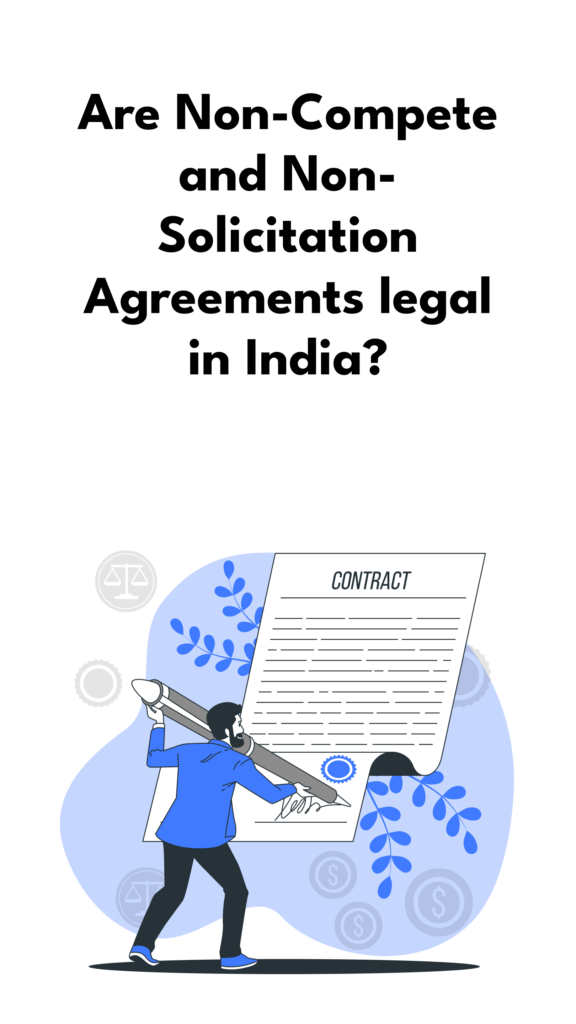Imagine a scenario where a key employee leaves your company to join a competitor, taking with them valuable trade secrets and customer relationships. This could potentially cause significant damage to your business. Non-Compete and Non-Solicitation Agreements are legal tools designed to prevent such situations. These agreements play a pivotal role in employee-centric environments, particularly in India, where they help maintain a balanced workplace by preventing employees from engaging in certain activities after their employment ends.

Table of Contents
What is a Non-Compete Agreement?
A Non-Compete Agreement is a contractual arrangement between an employer and an employee that restricts the employee from engaging in a similar business or profession that competes with the employer’s business. These may even be for a specified period and within a certain geographical area.
Example of a non-compete clause:
“The Employee agrees not to engage in any employment, business, or activity that is in any way competitive with the business or proposed business of the Company for one year within the city of Mumbai.”
These agreements prevent employees from sharing sensitive information, using proprietary knowledge, or leveraging client relationships for personal gain.
Understanding the fine print of your employment contract is crucial, especially when it concerns non-compete and non-solicitation clauses. Our guide on Why and How You Should Read Your Employment Contract offers invaluable insights into navigating and comprehending the intricacies of these agreements. It underscores the importance of being fully informed about your rights and obligations, helping you make educated decisions about your career trajectory.
What is a Non-Solicitation Agreement?
A Non-Solicitation Agreement is another type of contract that focuses on preventing former employees from soliciting the employer’s clients, customers, or other employees for their benefit or for the benefit of a competitor.
Example of a non-solicitation clause:
“The Employee agrees not to solicit any business from any of the Company’s clients or customers for a period of two years after leaving the Company.”
If an employee were to leave and take some of these clients with them to a new company, it could have a significant impact on the original company’s revenue. A Non-Solicitation Agreement would prevent this from happening.
In the context of safeguarding business interests, employment bonds often accompany non-compete and non-solicitation agreements. Our examination of Employment Bonds and Their Validity delves into the legal framework that governs these bonds, outlining when they’re enforceable and the fairness of their terms. This discussion provides a comprehensive view on how such bonds operate within the Indian legal system, aiding both employers and employees in understanding the boundaries of legal constraints and rights.
Is Non-Solicitation the same as a Non-Poaching Agreement?
It’s worth noting that a non-solicitation clause is different from a non-poaching agreement. While the former restricts the former employee from soliciting clients and employees, the latter is an arrangement between competing firms/businesses where one party agrees not to poach clients and customers of the other without following a specific procedure.
Are Non-Compete and Non-Solicitation Agreements legally valid in India?
The fairness of Non-Compete and Non-Solicitation Agreements is a subject of ongoing debate. While these agreements can protect a company’s interests, they can also limit an employee’s career opportunities.
For example, an overly restrictive Non-Compete Agreement might prevent an employee from finding work in their field of expertise. It’s important to consider the ethical implications of imposing such restrictions.
Employers can adopt several strategies to ensure a balanced approach to Non-Compete and Non-Solicitation Agreements. This includes:
- Tailoring agreements to specific roles and responsibilities.
- Specifying reasonable time and geographic limits.
- Offering fair compensation or other benefits to employees who agree to these restrictions.
Do courts enforce Non-Compete Agreements?
The enforceability of Non-Compete Agreements is determined on a case-by-case basis in Indian courts.
In the case of ‘Percept D’Mark (India) Pvt. Ltd. v. Zaheer Khan & Anr. (2006) 4 SCC 227’, the Indian Supreme Court ruled that a blanket restriction on an employee’s right to engage in a similar trade, business or profession is not enforceable. This case serves as a reminder that Non-Compete Agreements must be reasonable and specific.
Furthermore, in India, the Constitution guarantees the right to carry on any business, trade, or profession. However, any contract in restraint of trade is considered void. Thus, while a non-compete clause during employment is valid, one after employment termination is void.
The enforceability of Non-Compete Agreements in Indian courts depends on the specific terms of the agreement and the circumstances of each case. Courts will generally enforce these agreements if they are reasonable and do not impose undue restrictions on the former employee’s ability to earn a living.
Pre-termination vs. Post-termination Rights
It is important to distinguish between non-compete clauses that apply during the term of employment (pre-termination) and those that apply after the employment has ended (post-termination).
During the term of employment, non-compete clauses are generally enforceable. Employees have a fiduciary duty to act in the best interests of their employer, and this includes not competing with the employer while still employed. Courts are likely to uphold non-compete clauses that restrict employees from engaging in competitive activities during their employment.
However, post-termination non-compete clauses are subject to greater scrutiny. The Indian Contract Act, 1872, in Section 27, states that any agreement that restrains an individual from exercising a lawful profession, trade, or business is void. This has been interpreted by courts to mean that post-termination non-compete clauses are generally unenforceable. However, there are exceptions, and courts may enforce such clauses if they are reasonable and necessary to protect legitimate business interests.
The landmark case of Niranjan Shankar Golikari v. The Century Spinning & Mfg. Co. Ltd. (1967 AIR 1098) is an important reference in this context. In this case, the Supreme Court of India held that a non-compete clause during the term of employment is valid and enforceable. The Court noted that such clauses are necessary to protect the employer’s legitimate business interests, including trade secrets and confidential information.
However, the Court also emphasized that post-termination non-compete clauses must be reasonable and not overly restrictive. The Court stated that such clauses should not impose an undue hardship on the former employee or be against public policy. The reasonableness of a post-termination non-compete clause will be determined based on factors such as the duration of the restriction, the geographic scope, and the nature of the prohibited conduct.
Do courts enforce Non-Solicitation Agreements?
The enforceability of Non-Solicitation Agreements, like Non-Compete Agreements, is determined on a case-by-case basis in Indian courts. Generally, courts will enforce these agreements if they are reasonable and do not impose undue restrictions on the former employee’s ability to earn a living.
In determining the reasonableness of a Non-Solicitation Agreement, courts will consider factors such as the duration of the restriction, the geographic scope, and the nature of the prohibited conduct. For example, a Non-Solicitation Agreement that prevents a former employee from soliciting any of the employer’s clients for an indefinite period may be deemed unreasonable and unenforceable. On the other hand, an agreement that restricts solicitation of specific clients with whom the employee had direct contact for a reasonable period (e.g., one or two years) may be more likely to be upheld.
It is important to note that the burden of proof typically falls on the employer to demonstrate that the Non-Solicitation Agreement is necessary to protect legitimate business interests, such as client relationships and goodwill. Courts are more likely to enforce Non-Solicitation Agreements that are narrowly tailored to protect these interests without unduly restricting the former employee’s ability to work in their chosen field.
Are there alternatives to Non-Compete Agreements?
While Non-Compete and Non-Solicitation agreements are valuable tools, they are not absolute. There are alternative measures to protect company interests, such as Trade Secrets and Confidentiality Agreements that ensure sensitive business information remains protected, and Non-Disclosure Agreements that prevent employees from sharing confidential information, without preventing them from working in the same industry.
For example, a Non-Disclosure Agreement might include a clause like:
“The Employee agrees not to disclose any confidential information pertaining to the Company’s operations, customers, or trade secrets, both during and after their employment.”
While non-compete and non-solicitation agreements focus on post-employment conduct, understanding overall workplace misconduct is equally important. Our thorough exploration into Understanding Workplace Misconduct in India sheds light on what constitutes misconduct and the legal and ethical considerations involved. It also covers how businesses and employees can navigate these issues to foster a respectful and compliant work environment. This knowledge is pivotal for creating a workplace that respects individual rights while protecting company interests.
Conclusion
In conclusion, it’s crucial for employers to review their Non-Compete and Non-Solicitation Agreements regularly to ensure they’re fair and reasonable. Employees, too, should make sure they fully understand these agreements before signing them. By carefully drafting these agreements, providing proper communication and education, and adhering to legal requirements, employers can strike a balance that promotes loyalty, innovation, and growth within the organization.
Understanding your rights and responsibilities as an employee is crucial in today’s dynamic work environment. If you found this article insightful and wish to stay informed about your legal standings and workplace dynamics, subscribe to our newsletter “The Success Circle” for regular updates tailored especially for you.



